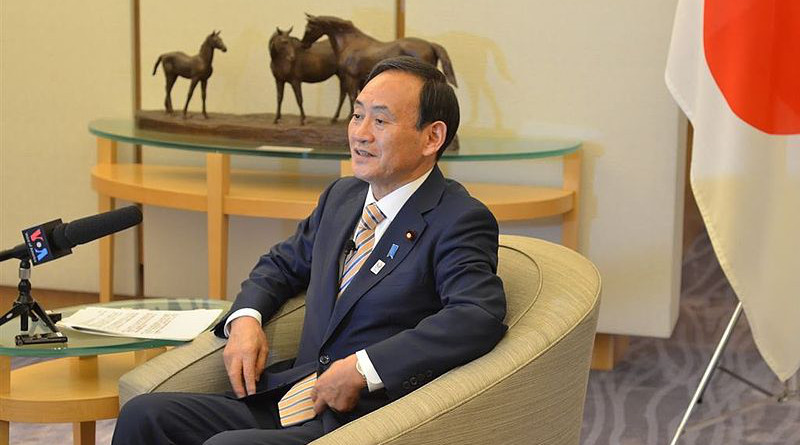Japan: Suga’s A Sure Bet In Leadership Election – Analysis
By Aurelia George Mulgan*
The outcome of Japan’s Liberal Democratic Party (LDP) leadership election on September 14 is a foregone conclusion and an election in name only. Chief Cabinet Secretary Yoshihide Suga will almost certainly succeed Shinzo Abe as Japan’s next prime minister on 16 September. This is a striking turnaround from just three months ago when his political standing was on much shakier ground.
The LDP’s factions remain the dominant players in party presidential elections. Historically, their principal role has been to elevate their leaders to the prime ministership. Becoming LDP president and Japan’s prime minister has traditionally required the support of a coalition of factions that command a majority of LDP Diet members.
On the maths, Suga — while nominally ‘factionless’ — is a clear winner against this criterion, especially given that the leadership vote will be closed to rank-and-file members owing to contested claims about the difficulty of an all-party vote. He has the backing of five out of seven LDP factions, plus a dozen or so non-factionally affiliated LDP parliamentarians. This will ensure around 276 votes for Suga representing at least 70 per cent of all LDP Diet members.
These figures suggest that the election will not be a real contest. The poll on 14 September will be engineered by the ‘old guard’ of the LDP, with the party’s Executive Council deliberately disenfranchising rank-and-file party members to produce their preferred outcome. The just-announced LDP prefectural branch presidential ‘primaries’ to choose three delegates from each branch to vote in the election are unlikely to alter the predicted outcome. The latest polls also show Suga outcompeting candidates from rival factions in public opinion — he has 38 per cent support compared with Shigeru Ishiba’s 25 per cent and Fumio Kishida’s 5 per cent.
Ultimately it comes down to the fact that Kishida and Ishiba’s factions can muster only 66 votes, or 17 per cent of LDP Diet members. They appear resigned to using the election as a trial run to build support for their bids in anticipation of the next party presidential election in September 2021. From this perspective Suga is seen as only leading a caretaker administration.
Other possible contenders for LDP president and prime minister — Defense Minister Taro Kono and Environment Minister Shinjiro Koizumi — have expressed no interest in pursuing what they see as a lost cause. Deputy Prime Minister Taro Aso and staunch Abe ally has said privately that Taro Kono ‘still needs more experience to become a good prime minister’. Koizumi has accused the party executive of ‘lying’ about the reason for excluding the party’s rank and file from the vote.
What are the implications of a Suga victory?
First, from a party-political perspective, it will confirm the continuing importance of LDP factions as key players in party presidential elections.
Second, from a Japanese government and policy perspective, a Suga administration will ensure policy continuity. Not only has Suga been an avid supporter and defender of Abe’s policies but he has also made an explicit commitment to continue them, stating, ‘I will take on the initiatives of Prime Minister Abe and do everything I can to take them forward’. Suga has declared he will assume responsibility for Abenomics and not upset the government’s existing agreement with the Bank of Japan on monetary easing. Suga is also likely to follow Abe’s foreign policies.
This raises the question whether Japan will end up with what is, in reality, a de facto Abe administration.
The fact that Suga lacks charisma, projects an image of a political functionary and has modest popular appeal also suits the former prime minister. Abe’s legacy is unlikely to be overshadowed or challenged by Suga. This could be another reason why Abe agreed with LDP Secretary-General Toshihiro Nikai and Deputy Prime Minister Aso that he should switch his long-held support for faction leader Fumio Kishida to succeed him across to Suga. The reality was Kishida faced certain defeat against Ishiba — Abe’s archrival — who has consistently had solid support from local LDP party members and who also represents a far greater long-term challenge to Abe’s legacy.
Suga is skilled at evading questions about politics and policy and at avoiding accountability as government spokesperson, including stonewalling and defending the indefensible scandals that repeatedly engulfed the Abe administration. This raises the question — will Suga remain Abe’s mouthpiece even after he becomes prime minister?
Abe’s role beyond the LDP presidential election is also unclear. Will he remain in the Diet? Will he run things from behind the scenes? Will Suga lead a puppet administration with Abe pulling the strings?
A more difficult question to answer is whether Suga’s government, like Abe’s, will be a Kantei-led administration. Under this system, those recruited to the prime ministerial executive from the political and bureaucratic worlds play a prominent role pursuing policy initiatives on behalf of the prime minister, subordinating both the ruling party and the Kasumigaseki ministries in the policymaking process.
One certainty is that Abe has undoubtedly set the bar higher for the prime ministerial leadership. He will be a hard act to follow.
*About the author: Aurelia George Mulgan is Professor at the School of Humanities and Social Sciences, the University of New South Wales, Canberra.
Source: This article was published by East Asia Forum

